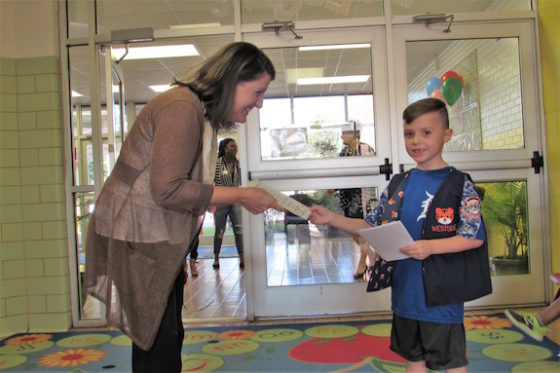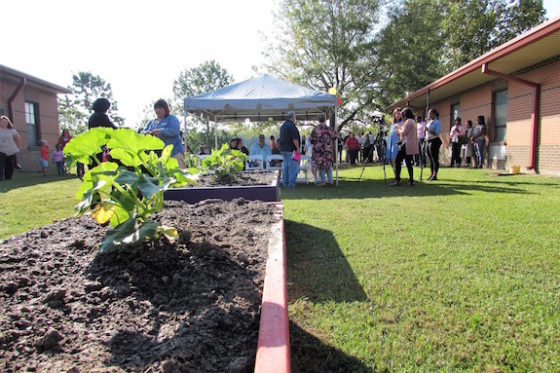WES ceremony dedicates planter boxes, cuts ribbon for new Pre-K unit

“This is exactly what education is supposed to be.”
Jeana Ross, secretary of the state’s Department of Early Childhood Education spoke enthusiastically about Westside Elementary School and its Pre-K program Friday.
WES hosted a ribbon-cutting for its second Pre-K classroom made possible through funding by the Office of School Readiness. The event was held in conjunction with the unveiling of planter boxes built at all four Demopolis school campuses, part of a service project for a Black Belt Teacher Corps project.
Some 50 state and local dignitaries, administrators, teachers, school board members and parents braved the bright sun to celebrate the opening of the newest Pre-K program. Joining them were the children in the school’s Pre-K classes.
 “It warms my heart” to see the crowd, said WES principal Roshanda Jackson. She also made a pitch for funding to open more classrooms. “In case there’s more funding, we have a waiting list,” she said.
“It warms my heart” to see the crowd, said WES principal Roshanda Jackson. She also made a pitch for funding to open more classrooms. “In case there’s more funding, we have a waiting list,” she said.
Each Pre-K class holds 18 four-year-olds. Another Pre-K class of children ages 3 and 4 has 13 students, including six who are special needs, funded by other grants.
Ross said the classroom program is expected to have a 25 percent match from the community. Looking at those attending, she said Demopolis support looks more like 100 percent.
“This school is loved,” she said.
Early childhood education “is closing the achievement gap,” she continued. It also lessens the numbers of student in special education and lowers absenteeism.
Tracye Strichik, director of the Office of School Readiness, said Alabama has been Number One in the nation in Pre-K education for the past seven years. The program provides one-on-one support to teachers to enable them to provide the best education to the youngest students.
Dr. Ken Tucker, president of the University of West Alabama, said the idea for the Black Belt Teacher Corps arose because teachers were hard to recruit to the most rural and poor section of the state.
Patterned after Teach for America, the students who receiving scholarships with the BBTC are required to teach in Black Belt schools for three years after graduation.
The funding for the corps began two years ago when money was found in the state Department of Education budget. Almost all of the initial $250,000 has gone to $10,000 scholarships.
Recipients also are required to take part in leadership training and to conduct a service project that meets identified needs in the community.
Allie Marques of Livingston chose to build three planter boxes on each campus for her “Sprouting Minds Garden” project. The vegetables grown in them are changed every season. This fall each box has pumpkin plants.
Marques, who grew up on a farm, believed students would better understand and enjoy their food if they had a part in planting it and watching it grow. She designed curricula to be in line with state standards for each grade level.
Helping her with the project were CEMEX, United Rentals and Poppies.

